Cyclades (Matagot or Asmodee/Bruno Cathala & Ludovic Maublanc, 2009)
2-5 players / 13 + / 60-75 minutes
The gravel crunched beneath my shifting sandals as I stood on the shore gazing out on the horizon. An ominous fleet stretched as far as I could see. The invasion was surely coming.
"So, Phaedrus," I said quietly to the austere priest beside me, "what say the oracles from the gods?"
"Well, my king," he replied reverently, "we cannot hope for the favor of Ares or Poseidon, so I'm afraid our forces are at the enemy's mercy. We cannot prevent his landing. But perhaps," he paused, looking out toward the vast sea.
"Yes?"
"We can win Athena's love and so be blessed with time."
"Time," I responded inquisitively. "What do you mean?"
"She will favor us in these days of Ares' sloth, presenting us an opportunity for our priests to summon a titan that still strikes fear even in the gods themselves. We can destroy the enemy's fleet before he can launch his invasion."
"Very well, then," I ordered defiantly. "Release the Kraken!"
What You Get:
 Part of me thinks these guys are just showing off. I mean, for $60 MSRP, this game should be entry #1 under "How to Make Components" in the Board Gaming Encyclopedia. The board comes in two halves, both double-sided in order to create four combinations scaled to the number of players. A third board tracks deities and turn order, and all three are quite solid. The five sets of army/navy figures have separate molds so that each player owns unique infantry and triremes. All of the cardboard tokens are sturdy and the coins intentionally cut slightly misshapen - a simple, yet tremendous thematic touch. The slick cards are just a wee bit better quality than a standard poker deck. The pair of custom dice are indented and marbled, with rounded corners, and of a good, solid weight. The deity tiles will stand up to repeated shuffling, as required. And there are five mythological creature miniatures of such detail that they almost seem out-of-place in a board game - not that we are complaining (my kids love them)! However, on average, miniature gamers are probably more suited than board gamers to exploit their true potential with paint. Finally, the artwork and design layout is stunning all around - other than the use of Kenny Rogers as a model for the philosopher. I'm no art historian, but the evocative and mystical beauty here seems to be a creation of Miguel Coimbra's familiar contemporary expressiveness mixed in with a classic Greco-Roman style. On a family friendly note, it also happily avoids suggestive and unnecessary sensuality - a trait unfortunately not adopted in the new Hades expansion.
Part of me thinks these guys are just showing off. I mean, for $60 MSRP, this game should be entry #1 under "How to Make Components" in the Board Gaming Encyclopedia. The board comes in two halves, both double-sided in order to create four combinations scaled to the number of players. A third board tracks deities and turn order, and all three are quite solid. The five sets of army/navy figures have separate molds so that each player owns unique infantry and triremes. All of the cardboard tokens are sturdy and the coins intentionally cut slightly misshapen - a simple, yet tremendous thematic touch. The slick cards are just a wee bit better quality than a standard poker deck. The pair of custom dice are indented and marbled, with rounded corners, and of a good, solid weight. The deity tiles will stand up to repeated shuffling, as required. And there are five mythological creature miniatures of such detail that they almost seem out-of-place in a board game - not that we are complaining (my kids love them)! However, on average, miniature gamers are probably more suited than board gamers to exploit their true potential with paint. Finally, the artwork and design layout is stunning all around - other than the use of Kenny Rogers as a model for the philosopher. I'm no art historian, but the evocative and mystical beauty here seems to be a creation of Miguel Coimbra's familiar contemporary expressiveness mixed in with a classic Greco-Roman style. On a family friendly note, it also happily avoids suggestive and unnecessary sensuality - a trait unfortunately not adopted in the new Hades expansion.
The goal in Cyclades is to own two metropolises. You can construct these through purchasing four unique buildings, which add up to one big city; or by collecting four philosophers, who somehow inspire the creation of such urban sprawl with all their hot air; or through military conquest, whereby you simply take one the old-fashioned way. The heart of the game lies in an auction that opens every round. In these auctions, you bid for the blessings of four different gods who each provide disparate benefits. If an opponent makes a higher offering to a god whom you already bid for, you must make an offering to a new deity. If yet another player out-bids you for that one, then you're allowed to return to your original choice as long as you increase the offering, thus sending that player groveling to another deity. And so on until everyone is happy with their choice or too broke to do anything about it. The gods also appear in random order every round (if you've seen Clash of the Titans, you know how utterly unpredictable they can be), so turn order is variable, depending on who secured which deity's favor. If you want to build up your army and attack, you must secure the favor of Ares. If you want to build up your navy and and sail around, you must bribe Poseidon. If you want priests and temples to give you discounts on offerings and creatures, you must grease Zeus' palms. If you want to build your metropolises through grandiose philosophizing, you'll need to flatter Athena. Then there's Apollo - who is so easy to appease that he's free (and always last) - if you want to kick back and rest, or can't afford to out-bid other players. Mythological creatures randomly appear to throw interesting and pesky options at anyone with the opportunity, and the gold, to pick one up and use their special powers.
E for Everyone:
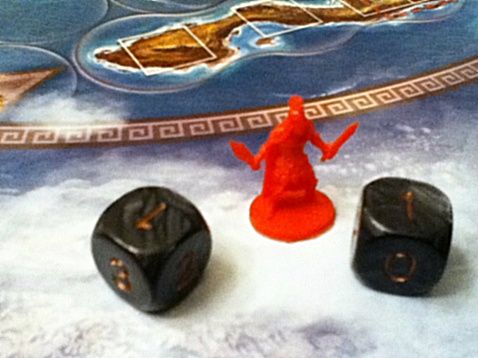 I am quite puzzled at the 13+ recommended age rating. While strategy games are more optimally suited for adults and older teens, Cyclades is fairly straight-forward, rules-wise. No, I'm not saying a fifth-grader will destroy a retired grognard. But the options and chrome in this title are much more manageable than other games. That might be part of the perception. Despite the super cool dudes on a map, don't think for a minute this is standard Ameritrash fare.
I am quite puzzled at the 13+ recommended age rating. While strategy games are more optimally suited for adults and older teens, Cyclades is fairly straight-forward, rules-wise. No, I'm not saying a fifth-grader will destroy a retired grognard. But the options and chrome in this title are much more manageable than other games. That might be part of the perception. Despite the super cool dudes on a map, don't think for a minute this is standard Ameritrash fare.
The psychological war waged in the gods auction is the meat of the game and this grows in intensity as the game crescendos to its conclusion. In essence, you are competing for both turn order and role selection by trying to out-bid the other players. This creates a couple of layers to what would otherwise be a generic auction mechanic. First, you have to consider the turn order in addition to your desired god or goddess. The favors granted to you by appeasing a particular deity may be offset by going third or fourth in turn order. Second, you need to weigh the need of accomplishing your own goals verses hindering another's. Perhaps you'd like to go after Poseidon to position your fleet for a future invasion, but who cares when your enemy is sitting there ready to grab Athena and her philosophers to build a second metropolis for the win. All information is available, except for how much gold each player owns, so you know exactly what each player needs to complete their second metropolis. Therefore, a guessing game ensues in trying to figure out if your opponent has enough money for their offering, as well as to pay for the required resource(s) necessary for the victory. Then on top of all that, you'll need to consider who the next beneficiary will be in all that maneuvering!
At first, some gamers might be disgruntled that you are limited to particular actions based on which deity you acquire. Being prohibited from attacking just because you're out-bid for Ares can be frustrating. But each god and goddess has benefits. If other players are out for blood with Ares or Poseidon, you can sit back with Athena and collect philosophers in order to complete a metropolis. If bidding wars are driving up offerings higher than the price of gas, grab Zeus to nab some priests which give you discounts on your bids. And if you find that you simply can't grab the deity you need at the right time, keep an eye out for a mythological creature that might give you an opportunity otherwise not available. Even if you have to settle on Apollo, you at least get to save your money while increasing your future prosperity. Indeed, it is very likely you'll go running his way by choice at least once per game!
There are some other finer points regarding kid appropriateness. Elimination is not an issue since you cannot attack a player's sole remaining island unless successfully capturing it will earn you victory. If you own only one island, Apollo gives you more gold to help combat the "weak get weaker" problem. Battles are resolved quickly and simply - they reward good strategy and favor the stronger side, yet add dice rolls to give the weaker army a puncher's chance (unless outnumbered greater than 3-1). After the auction round, downtime is minimal and sometimes nearly non-existent. There are no victory points to gloat over in this one, but the two-metropolis win condition will usually keep this game to around 60-90 minutes.
On the slightly negative side, there can be some irritable moments over losing bids if members of your group are sensitive to frequent interaction. Some gamers might have issue with the numerous icons used to indicate the various powers of the gods and mythological creatures. They're splayed all over each player's aid screen and can be confusing at first. Most adults will have them memorized after a few games while it should only take kids, on the other-hand, a few turns! The only potentially major issue with the game is analysis paralysis. As god selection and open information become critical to the end-game, it can very much devolve into a thinker's chess match. Although you're not allowed to trade any resources, the rulebook says nothing against alliances. It is probably best to implement a rule prohibiting the free and open discussion of mutual strategy. There is already a natural "gang up on the leader" element toward the end, but discouraging mutual planning to a degree not only increases the end-game tension, but will keep the game from dragging. That's purely optional, of course.
 Okay, I'll Shut Up Now:
Okay, I'll Shut Up Now:
In the end, I give Cyclades a 9 on the Board Game Geek scale (Excellent game. Always want to play it). The auctions create a tense, mini meta-game in which you need to balance how to achieve your own goals while thwarting your opponents' strategies. Kids will learn how to make the best choice available when often presented with limited options. After all offerings are resolved, game play is smooth and quick. Conflict plays an important part, yet is not overwhelming. Luck is mitigated by the deity roles and well-timed planning. And it does not overstay its welcome. Cyclades is a unique and highly thematic title seamlessly blending Ameritrash and Euro game elements.
The gravel crunched beneath my shifting sandals as I stood on the shore gazing out on the horizon. An ominous fleet stretched as far as I could see. The invasion was surely coming.
"So, Phaedrus," I said quietly to the austere priest beside me, "what say the oracles from the gods?"
"Well, my king," he replied reverently, "we cannot hope for the favor of Ares or Poseidon, so I'm afraid our forces are at the enemy's mercy. We cannot prevent his landing. But perhaps," he paused, looking out toward the vast sea.
"Yes?"
"We can win Athena's love and so be blessed with time."
"Time," I responded inquisitively. "What do you mean?"
"She will favor us in these days of Ares' sloth, presenting us an opportunity for our priests to summon a titan that still strikes fear even in the gods themselves. We can destroy the enemy's fleet before he can launch his invasion."
"Very well, then," I ordered defiantly. "Release the Kraken!"
What You Get:
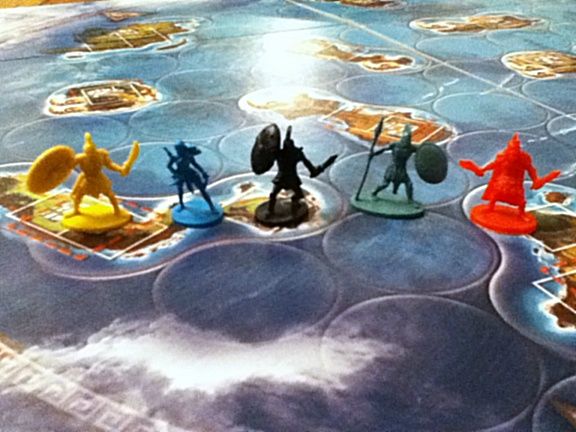 | |
| Unique men and boats for all. |
 Part of me thinks these guys are just showing off. I mean, for $60 MSRP, this game should be entry #1 under "How to Make Components" in the Board Gaming Encyclopedia. The board comes in two halves, both double-sided in order to create four combinations scaled to the number of players. A third board tracks deities and turn order, and all three are quite solid. The five sets of army/navy figures have separate molds so that each player owns unique infantry and triremes. All of the cardboard tokens are sturdy and the coins intentionally cut slightly misshapen - a simple, yet tremendous thematic touch. The slick cards are just a wee bit better quality than a standard poker deck. The pair of custom dice are indented and marbled, with rounded corners, and of a good, solid weight. The deity tiles will stand up to repeated shuffling, as required. And there are five mythological creature miniatures of such detail that they almost seem out-of-place in a board game - not that we are complaining (my kids love them)! However, on average, miniature gamers are probably more suited than board gamers to exploit their true potential with paint. Finally, the artwork and design layout is stunning all around - other than the use of Kenny Rogers as a model for the philosopher. I'm no art historian, but the evocative and mystical beauty here seems to be a creation of Miguel Coimbra's familiar contemporary expressiveness mixed in with a classic Greco-Roman style. On a family friendly note, it also happily avoids suggestive and unnecessary sensuality - a trait unfortunately not adopted in the new Hades expansion.
Part of me thinks these guys are just showing off. I mean, for $60 MSRP, this game should be entry #1 under "How to Make Components" in the Board Gaming Encyclopedia. The board comes in two halves, both double-sided in order to create four combinations scaled to the number of players. A third board tracks deities and turn order, and all three are quite solid. The five sets of army/navy figures have separate molds so that each player owns unique infantry and triremes. All of the cardboard tokens are sturdy and the coins intentionally cut slightly misshapen - a simple, yet tremendous thematic touch. The slick cards are just a wee bit better quality than a standard poker deck. The pair of custom dice are indented and marbled, with rounded corners, and of a good, solid weight. The deity tiles will stand up to repeated shuffling, as required. And there are five mythological creature miniatures of such detail that they almost seem out-of-place in a board game - not that we are complaining (my kids love them)! However, on average, miniature gamers are probably more suited than board gamers to exploit their true potential with paint. Finally, the artwork and design layout is stunning all around - other than the use of Kenny Rogers as a model for the philosopher. I'm no art historian, but the evocative and mystical beauty here seems to be a creation of Miguel Coimbra's familiar contemporary expressiveness mixed in with a classic Greco-Roman style. On a family friendly note, it also happily avoids suggestive and unnecessary sensuality - a trait unfortunately not adopted in the new Hades expansion.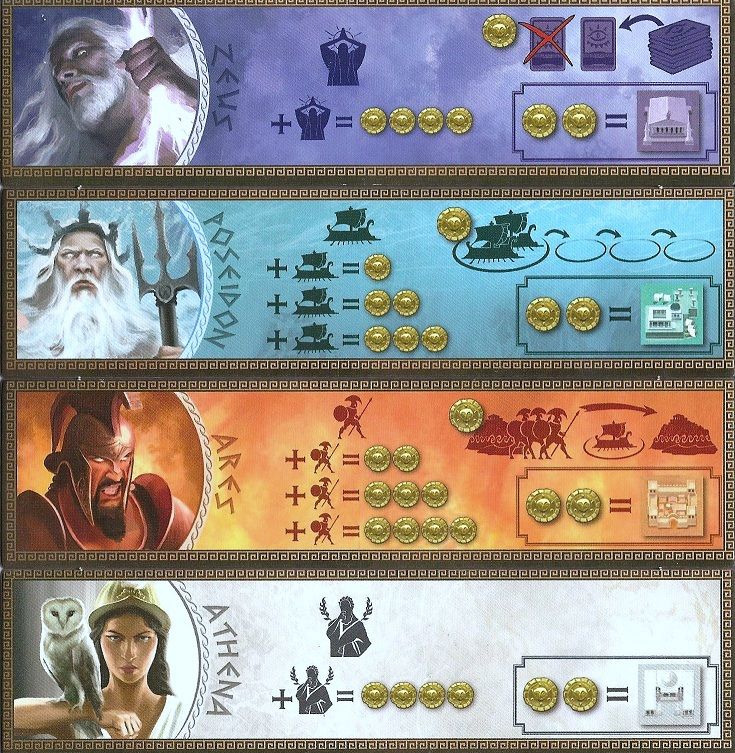 |
| Swag offered by the gods. |
E for Everyone:
 I am quite puzzled at the 13+ recommended age rating. While strategy games are more optimally suited for adults and older teens, Cyclades is fairly straight-forward, rules-wise. No, I'm not saying a fifth-grader will destroy a retired grognard. But the options and chrome in this title are much more manageable than other games. That might be part of the perception. Despite the super cool dudes on a map, don't think for a minute this is standard Ameritrash fare.
I am quite puzzled at the 13+ recommended age rating. While strategy games are more optimally suited for adults and older teens, Cyclades is fairly straight-forward, rules-wise. No, I'm not saying a fifth-grader will destroy a retired grognard. But the options and chrome in this title are much more manageable than other games. That might be part of the perception. Despite the super cool dudes on a map, don't think for a minute this is standard Ameritrash fare.The psychological war waged in the gods auction is the meat of the game and this grows in intensity as the game crescendos to its conclusion. In essence, you are competing for both turn order and role selection by trying to out-bid the other players. This creates a couple of layers to what would otherwise be a generic auction mechanic. First, you have to consider the turn order in addition to your desired god or goddess. The favors granted to you by appeasing a particular deity may be offset by going third or fourth in turn order. Second, you need to weigh the need of accomplishing your own goals verses hindering another's. Perhaps you'd like to go after Poseidon to position your fleet for a future invasion, but who cares when your enemy is sitting there ready to grab Athena and her philosophers to build a second metropolis for the win. All information is available, except for how much gold each player owns, so you know exactly what each player needs to complete their second metropolis. Therefore, a guessing game ensues in trying to figure out if your opponent has enough money for their offering, as well as to pay for the required resource(s) necessary for the victory. Then on top of all that, you'll need to consider who the next beneficiary will be in all that maneuvering!
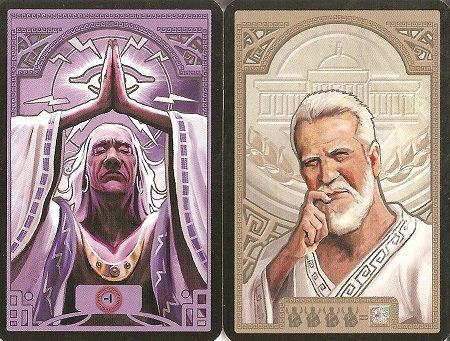 |
| What's with the Apache and Kenny Rogers? |
There are some other finer points regarding kid appropriateness. Elimination is not an issue since you cannot attack a player's sole remaining island unless successfully capturing it will earn you victory. If you own only one island, Apollo gives you more gold to help combat the "weak get weaker" problem. Battles are resolved quickly and simply - they reward good strategy and favor the stronger side, yet add dice rolls to give the weaker army a puncher's chance (unless outnumbered greater than 3-1). After the auction round, downtime is minimal and sometimes nearly non-existent. There are no victory points to gloat over in this one, but the two-metropolis win condition will usually keep this game to around 60-90 minutes.
 |
| One metropolis (top). |
 Okay, I'll Shut Up Now:
Okay, I'll Shut Up Now:In the end, I give Cyclades a 9 on the Board Game Geek scale (Excellent game. Always want to play it). The auctions create a tense, mini meta-game in which you need to balance how to achieve your own goals while thwarting your opponents' strategies. Kids will learn how to make the best choice available when often presented with limited options. After all offerings are resolved, game play is smooth and quick. Conflict plays an important part, yet is not overwhelming. Luck is mitigated by the deity roles and well-timed planning. And it does not overstay its welcome. Cyclades is a unique and highly thematic title seamlessly blending Ameritrash and Euro game elements.

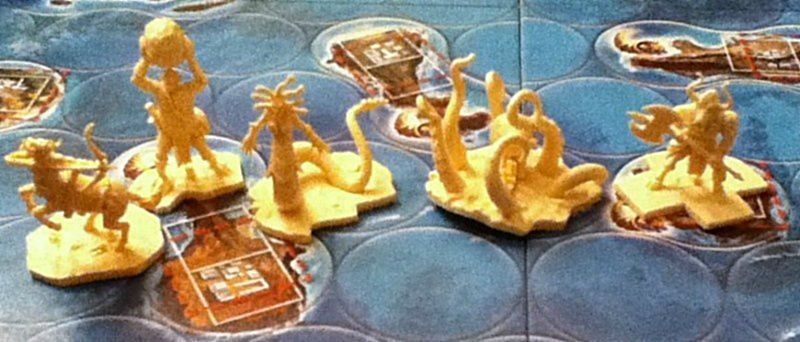
This game looks much better than I had thought it would. I'll have to check it out.
ReplyDelete